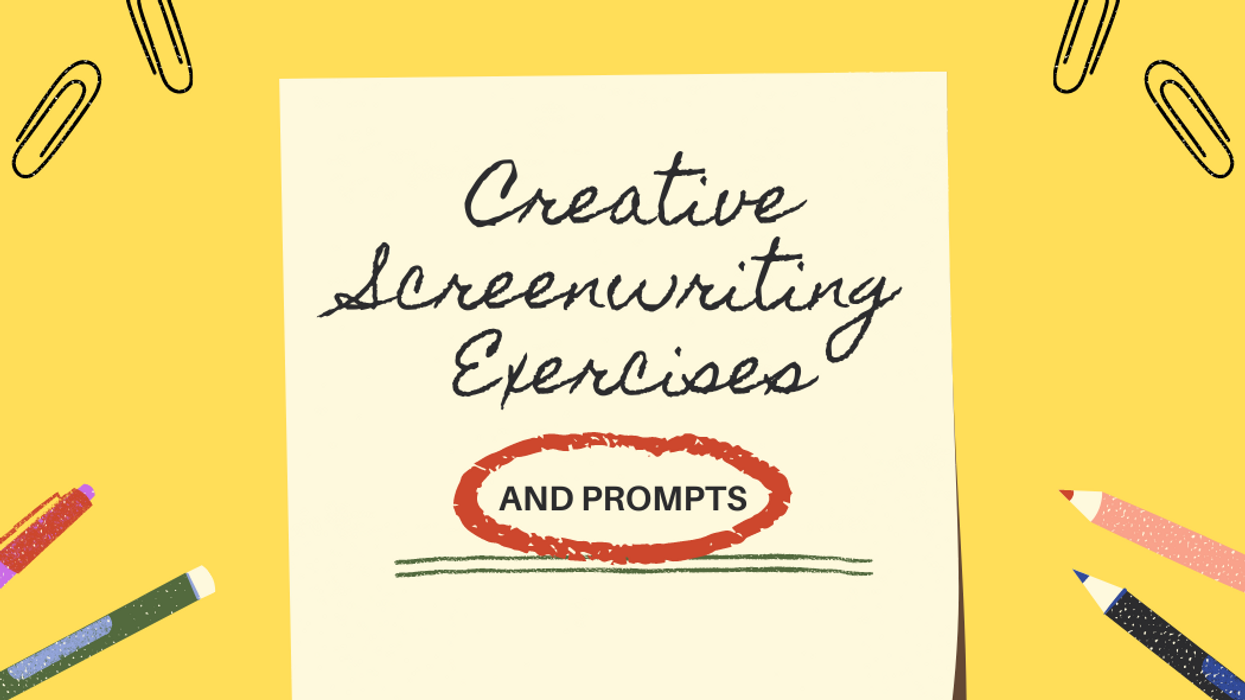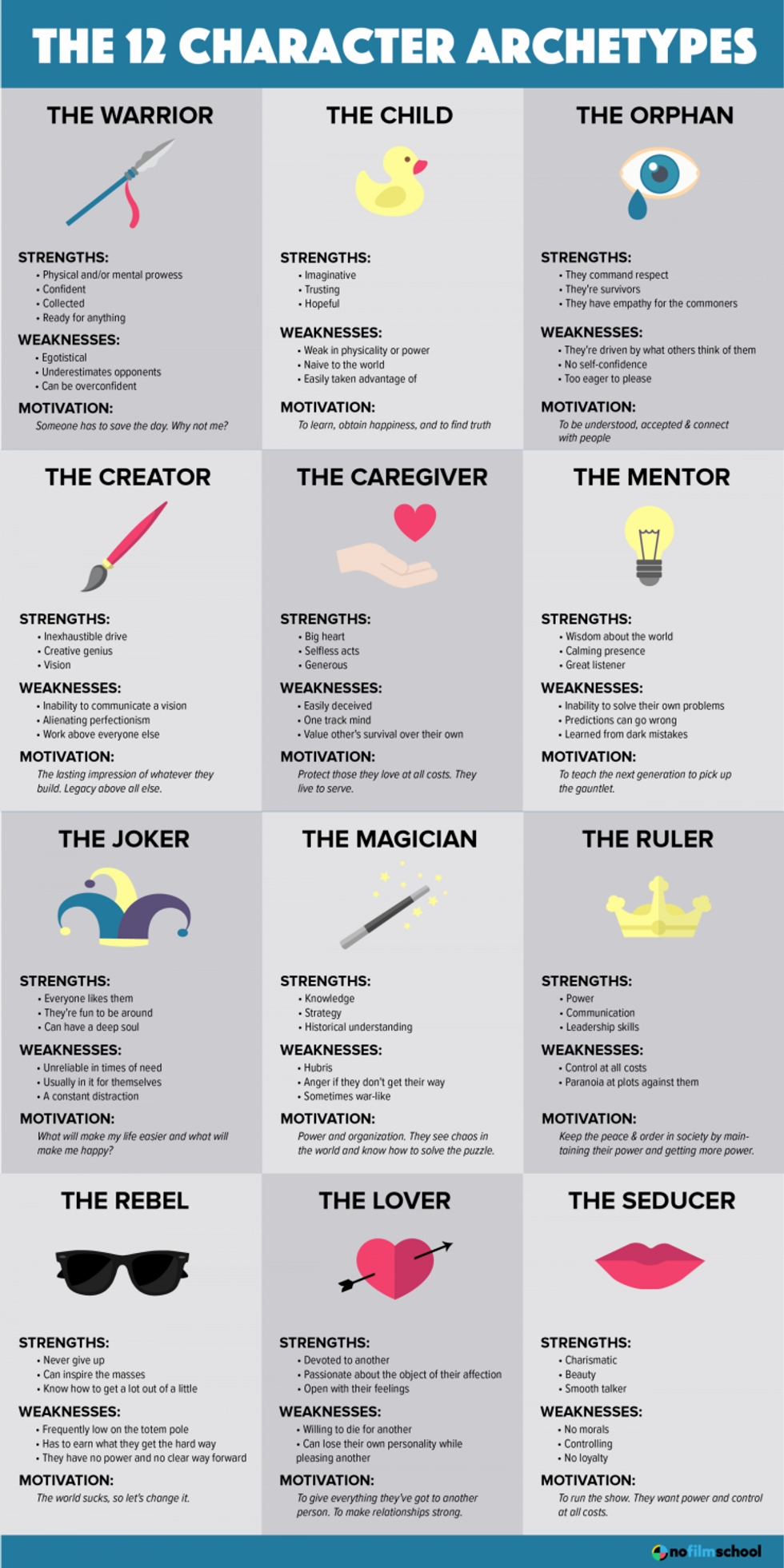Creative Screenwriting Exercises, Character, and Dialogue Prompts
Writing exercises for screenwriters can kickstart your creativity.

Sometimes sitting in front of your computer is not enough to make writing happen. We've talked about writer's block in the past, and my summation of how to beat it was just to write on or write something different.
But how do you do that?
The short answer is: try some creative writing practice exercises. These are tools that you can use to really jumpstart your brain's battery. They can be worksheets or prompts or just exercises that get you thinking outside of the box.
The "science" behind them is simple. When you shake your mind out of the mundane and the ordinary, you can find solutions to your problems. The best writing exercises are not procrastination but ways to get you back to doing your best work.
These aren't just writing exercises for aspiring writers, but things season professionals use to unlock their best ideas.
So today, I want to go over some of these strategies and how they can apply to you.
Let's get started.
Screenplay writing worksheets
One of the things I've tried to do here at No Film School is democratize screenwriting for the masses. That meant building a ton of worksheets to help guide people through the process of writing a script. We have the book, which you should download (free screenwriting eBook), but we have a lot of screenplay writing worksheets, too.
Check out some of the ones below.
Treatments
A treatment is a multi-page document written in prose that tells the story that happens in your screenplay. It is a synopsis, with action and sparse dialogue, and works as a roadmap for the reader, producer, and writer.
Outlines
A screenplay outline helps you organize your thoughts and the beats of the story. It's a way to also entice yourself and the reader of the outline.
Beat sheet
A beat sheet is a list of emotional moments in a feature film screenplay that helps a writer outline their story.
Creative writing prompts
In general, screenwriting and creative writing share a lot of the same theories behind them. All writing is about communicating to an audience.
Most of the ones I find to be most effective come from a place of emotional vulnerability. If you begin writing from a place where you are vulnerable, you might share things with an audience that make them connect to your story and characters.
Some examples of creative writing prompts are:
- What does it feel like not to be loved back?
- Have you ever been alone in the wilderness?
- What's it like to make eye contact with someone special for the first time?
- Describe a near-death experience.
- Have you ever been lost on backroads?
- What form would your personal demons take?
- Write a passionate letter to your nemesis.
- Have you ever lost a fight?
Check out 700+ creative writing prompts here.
Character prompts
Crafting interesting and unique characters takes a lot of effort. You need to think about people you know, people you'd like to meet, and get inside actors' minds to make sure someone wants to play these creations.
None of this is easy to do, but hopefully, our character prompts help guide the way.
Character archetypes
What are character archetypes? They're broad-stroke headings that refer to the kinds of characters in stories or screenplays.
I love using these molds to help me learn about expected outcomes or tropes. But also, I like to lean into certain qualities presented to format parts of the story I'm working on telling. I think they are useful tools to help inspire and breathe life into the people on your pages.
Character development
Character development comes in two parts: internal and external.
You can think of internal character development as your character's fundamental goals and motivations for their actions. And external development as the struggles and scarring or transformative experiences that make them who they are on the outside.
Character arcs
A character arc is an emotional and physical transformation that a character undergoes throughout a film, TV episode, TV season, or TV series. The character arc depends on the person's physical and emotional response to events in the story.
Screenplay ideas and screenwriting prompts
Now that you have the basic worksheets on how to write a screenplay, let's look at some prompts to get you out of the tough binds you'll get into on the page.
Scene prompts
One of the hardest things to do when you're writing is just to get through a hard scene. One of the things I like to do is to insert a new genre into the movie or TV show. Like, when I am writing horror, I try to write a romcom scene into it. Does it fit, will it advance a storyline?
Another tip I would push is to make it rain.
Changing the weather in a scene can add drama or comedy. It can also spark more nuance and add tension.
So what are some generic scene prompts to get you started beyond that?
- A stalk and kill murder
- A hunting trip
- Losing your pill case
- Someone is poisoned
- A character with allergies visits a buffet
- A chase on bikes
- You're out at dinner, and your ex arrives
- Your best friend is the villain
- A text break up
- A 911 call
- Your grandparent makes a confession
- A door-to-door salesman offers something unusual
- Astronauts locked out of their shuttle
- A domestic dispute between a cat and a dog
- Coal miners find a nugget of gold
We have 75 more writing prompts that will supercharge your scenes, and if that's not enough, you can check out 100 Scene-Writing Prompts here.
Dialogue writing prompts
When your scene is going well, bad dialogue can derail it.
We have some tips for writing dialogue, but you should think about the prompts. What do your characters believe in, where have they been in their lives? Is this a conversation where they are giving or getting advice? Are they talking about one thing but mean another? Maybe they see something in the street or hear a song come on the radio.
When it comes to writing dialogue, try to make it feel like a natural conversation.
Drama writing exercises
As we know from our drama genre article, these film and TV series portray realistic characters in conflict with either themselves, others, or forces of nature. They usually focus on character and how these people arc over time.
When it comes to the exercises at the center of this genre, you have to think about the root of every scene... conflict!
Some drama writing exercises can be:
- Siblings fighting over their mother's vase
- A couple trying to convince each other to rent a different movie
- Two people trying to get in the same cab
- Someone is not being allowed into a party because they aren't on the list
- There's one bullet left, and each hitman needs it for their job
- Someone refuses to put their hands up during a robbery
- You stop for directions, and the person at the gas station doesn't want you to get where you are going
As you can see, any of these situations involve squaring two or more people off against each other. The center of the drama is conflict. Let this stuff get weird and wild, and see where these stories can take you.
Comedy writing exercises
The comedy genre covers any work in film or television whose general purpose is to create humor and intentional laughs for the audience. It has its origins in ancient Greek plays and oral tradition. People love engaging in comedy. It puts them in a good mood and can be incredibly good at keeping their mind off bad things.
To make your comedy writing pop, you need to workshop different punchlines, setups, and situations.
Some comedy writing exercises can be:
- A traveler comes to the future and is confused
- What goes on inside your pet's mind
- A billionaire becomes poor overnight
- An alternate universe where no one can lie
- Ghosts who like to tease people
- Escalating pranks lead to a school assembly
- A beekeeper loses its but needs honey right away
- A marble factory explodes and sends the balls all over town
- A queen from a foreign country comes to find romance in America
Most comedy prompts are just experiences that would be a drama in any other light. They should be difficult for people, and we should see them go through hell. This will make sure the jokes all land, because we like to laugh at other people's misery.
Summing up creative screenwriting exercises, character, and dialogue prompts
Now that you've mastered all these scenes and prompts, you can get back into your own work and put them to good use. So much of writing is just about jarring you from the place of stasis and challenging you to be vulnerable with the audience.
The goal of all the exercises here is to make you better at understanding yourself, your characters, and the progression of your story.
Got more tips for us? Put them in the comments.
I can't wait to read what you write next.
Now get back to work.








 "'Back Home"via Mercedes Arutro
"'Back Home"via Mercedes Arutro 'Back Home'via Mercedes Arutro
'Back Home'via Mercedes Arutro 









